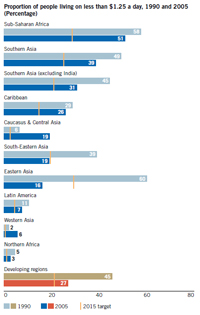Related Articles
A great deal is being made of the fact that global population has surpassed 7 billion people today. A number of folks on the left are worried about what this means for the planet. The Seattle Times features a story about the milestone, saying it comes "amid fears of how the planet will cope."
At The Atlantic, they posted a number of photos with the ominous note that the increasing population "will mean growing, shipping, and distributing more food while providing more clean water, health care, and shelter -- all without inflicting too much further damage on our environment."
These claims have been around for decades, with predictions that the collapse is just around the corner. The king of such predictions is Paul Ehrlich. As I write in "Eco-Fads," Ehrlich confidently claimed in 1976 that, “Before 1985, mankind will enter a genuine age of scarcity . . . in which the accessible supplies of many key minerals will be facing depletion."
Even after such claims were proven wrong, Ehrlich continued to claim he w as correct. In an interview in 2008, Ehrlich told a Portland radio station that his predictions were still accurate, but the timeline was simply different, arguing that “these things work on a decadal time schedule.” Indeed, he argued, “The Population Bomb was too optimistic and that in many ways, the situation is far worse today than I could have imagined when I wrote the book in 1968.”
as correct. In an interview in 2008, Ehrlich told a Portland radio station that his predictions were still accurate, but the timeline was simply different, arguing that “these things work on a decadal time schedule.” Indeed, he argued, “The Population Bomb was too optimistic and that in many ways, the situation is far worse today than I could have imagined when I wrote the book in 1968.”
These predictions were wildly off the mark. According to the UN, the number of people living in extreme poverty worldwide fell from 42 percent in 1990 to 25 percent in 2005, perhaps the most dramatic reduction in poverty in human history.
India, the subject of Ehrlich's concern, is the most ironic example. While the population of India doubled since 1970, the per capita income increased significantly and is now a symbol of growing prosperity in the world.
Sadly, many on the left oppose policies that would help continue these positive trends. Free trade, for instance, is extremely positive for developing countries, as Paul Krugman wrote in his book Pop Internationalism:
If the west throws up barriers to imports out of a misguided belief that they will protect Western living standards, the effect could be to destroy the most promising aspect of today's world economy: the beginning of widespread economic development, of hopes for a decent living standard for hundreds of millions, even billions, of human beings.
Krugman wrote those words in the early 1990s. As the UN data show, he was spot on – poverty declined dramatically in the decade that followed as globalization increased.
Too many greens wring their hands over the theoretical, but disproven, impacts of population increases. Meanwhile, they ignore the real data, favoring policies that are likely to cause the very misery they claim to fear.


